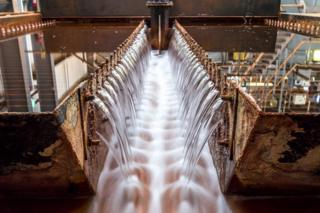Homes to be heated by warm water from flooded mines
 Image copyright Gov
Image copyright Gov Burning coal has contributed to the over-heating of our planet. But can abandoned British coal mines help tackle the climate crisis?
A new garden village in County Durham will soon be getting its heat from a surprising source: it will be warmed by water from a disused mine.
The temperatures are raised naturally, by heat from the Earth’s crust. The water is then pumped up from flooded shafts and used to heat the whole district using a single system.
The 1,500 residents of South Seaham Garden Village shouldn’t notice that the warmth from the radiators derives from the dust-smeared sweat of their forebears.
Surveying work for the scheme is due to happen soon.
If the project succeeds, it’ll help meet the UK target of virtually zero carbon emissions by 2050.
Untapped potential
The potential is large because around a quarter of Britain’s homes sit on coalfields.
Although some mines won’t be suitable, it’s hoped that many will supply consistent warm water.
For the Coal Authority, which manages disused pits, the idea could turn a liability into a profit.
Selling warm water might cover the costs of pumping mines, which has to be done anyway to prevent them burping dirty mine water up to the surface.
It would be good news for the environment too, because heat for homes, business and industry is the single biggest contributor to UK emissions – producing almost 40% of Britain’s CO2.
The energy minister, Kwasi Kwarteng, told BBC News: “I think it’s potentially transformational. We have this huge historic legacy in terms of coal, and being able to use that footprint and turn it into a source of green energy – that’s incredibly positive.”
Liability or asset?
Jeremy Crooks from the Coal Authority, which is responsible for closed mines, told us: “The mines are an asset that’s been seen as a liability.
Now, with people being much more aware of the damage to climate, other opportunities are being seen.”
He said in the right circumstances the costs could compare with gas – which warms 95% of UK homes that have central heating.
Minewater heating is low-carbon, but not carbon-free because the water has to be further warmed using a heat pump, which operates like a fridge in reverse.
The Coal Authority said electricity to run the pumps would be sourced from renewables where possible.
Hidden problems
There are other caveats too, according to Dave Banks, a hydrogeologist at Holymoor Consultancy. These include:
- Uncertain geology: often mines are poorly-mapped and engineers drilling 300 metre boreholes may have to hit a target four metres wide. That’s no mean feat, he said
- Hydrology: The quantity of water in the shafts might run out after time
- Maintenance: Mine water can be corrosively salty. It may also contain high quantities of iron or manganese which can clog up pumps and heat exchangers
Mr Banks said one small trial heating scheme in Scotland had closed after it became too costly to maintain.
He said maintenance could be better handled by a large project such as one underway in Gateshead town centre.
It will heat council buildings, a new care home, and up to 1,250 new homes.
- Coalfields in Northern Ireland are not covered by the Coal Authority
Plans are also underway at Rugeley in Staffordshire, where a former coal-fired power station will be turned into a village of 2,300 homes heated partly by water from disused shafts.
Currently 14 minewater heat schemes are planned for the north, with seven in the rest of England. Five are planned for Scotland and four for Wales – with a scheme at Caerau, Bridgend the furthest progressed.
The technology could prove important in countries such as Poland, which suffer cold winters but have plentiful coal mines.
The developments come as campaigners in the UK complain that the government is poised to end grants for commercial users of heat pumps extracting warmth for buildings from sewage farms and industrial plants.
Follow Roger on Twitter.
